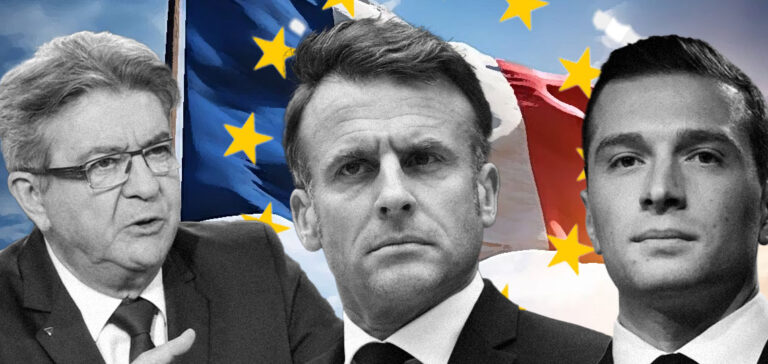Energy policy in France has become a crucial issue, at the crossroads of environmental, economic and geopolitical concerns. Faced with climate commitments and the need to provide reliable, affordable energy, France’s three main political parties are putting forward divergent visions. The Rassemblement National (RN), Renaissance (the presidential party), and the Nouveau Front Populaire (NFP) each present distinct strategies for France’s energy future, differing notably on technological priorities, energy transition, national sovereignty and economic implications.
Nuclear power: a contested pillar
The RN sees nuclear power as the key to France’s energy independence. The party proposes a significant increase in the number of nuclear reactors, aiming to produce 80% of electricity by 2050. They also support the introduction of SMR (Small Modular Reactors), although these technologies are still in the development phase and raise questions about their economic viability. The plan is to build ten new reactors by 2031 and a further ten by 2036, but experts consider these targets unrealistic because of the time and cost involved.
For its part, Renaissance is also banking on nuclear power, with an ambitious program that includes the construction of 14 new nuclear reactors in two phases, as well as the development of SMRs. The party proposes to extend the lifespan of existing reactors to guarantee stable, low-carbon production. Renaissance combines this strategy with strong support for renewable energies, offering a more balanced approach.
Renewable Energies: Diverging Visions
The RN strongly criticizes wind and solar power for their intermittency and dependence on foreign technologies, particularly Chinese. This could slow down the energy transition and increase dependence on fossil fuels during the transition to nuclear power.
Renaissance, on the other hand, places a strong emphasis on renewable energies. The party plans to double onshore wind power capacity to 40 GW by 2035, and to reach 18 GW for offshore wind power. They also aim to increase the rate of deployment of solar photovoltaic energy to 75 GW by 2035. A fund has been set up to renovate 300,000 homes by 2027, with a particular focus on low-energy housing.
The NFP strongly supports renewable energies, with the ambition of making France a European leader in marine energies and strengthening renewable production sectors. They are firmly opposed to the privatization of France’s hydroelectric dams, and propose keeping these infrastructures under public control.
Gas and Hydrogen Utilization: Short- and Long-Term Strategies
To make up for the delay in deploying new nuclear capacity, NR proposes the temporary use of gas-fired power plants, although this solution is criticized for its impact on CO2 emissions and increased dependence on gas imports. It also plans to support gas pipeline infrastructure to secure supplies.
Renaissance prefers to invest in more sustainable solutions such as green hydrogen. They foresee massive investment in green hydrogen production, with a target of 6.5 GW of electrolysis capacity by 2030, including the development of the infrastructure needed to support this technology. Although the NFP has a coherent vision for the promotion of traditional renewable energies such as wind and solar power, it is struggling to clarify its position on the integration of hydrogen into its energy strategy. This ambiguity could influence the economic and social implications of their program.
Economic and social implications
The RN promises to re-establish “a French electricity price” by negotiating a 30% cut with Brussels, although this promise is deemed unrealistic. They also propose reducing VAT on fossil fuels to 5.5%, which would cost the public purse 168 billion euros. The party advocates a policy of energy sovereignty to reduce dependence on imports.
Renaissance proposes to cut electricity bills by 10% to 15% by reforming the European electricity market. They offer subsidies for renewable energy and decarbonated hydrogen projects, and plan to simplify administrative procedures for SMEs. The party’s aim is to reduce employer charges to encourage wage increases without increasing costs for companies.
The NFP proposes to abolish planned increases in electricity and gas prices, and is firmly opposed to tariff increases. They advocate a more social energy policy to protect consumers, particularly low-income households and small businesses. However, the financial means to support these proposals are not always clear, which could limit their implementation.
The diversity of energy programs proposed by the main French political parties reflects not only contrasting visions but also distinct strategic priorities for the country’s energy future. While the RN relies mainly on nuclear expansion to ensure energy independence and is highly critical of renewables, Renaissance takes a more balanced approach, combining nuclear and renewables while supporting green hydrogen. For its part, the Left Alliance presents a divided position on nuclear power but firm support for renewable energies, emphasizing the preservation of public hydroelectric resources. On the economic and social front, proposals also vary. The RN promises significant cuts in electricity prices and supports a policy of energy sovereignty, although its proposals are widely disputed for their financial realism. Renaissance focuses on electricity market reform, clean energy subsidies and measures to support SMEs, while NFP opposes tariff increases and advocates a more social energy policy.
In short, the energy policy debate in France is intensely polarized, with clear fault lines between those who favor nuclear power as the central pivot of the energy transition and those who see renewable energies as the path to a more sustainable future. The results of the recent parliamentary elections underline this division, with a growing fragmentation of the political landscape. France’s energy future will depend not only on technological choices, but also on the ability of decision-makers to reconcile energy security, environmental sustainability and social justice in a complex and rapidly changing economic context.






















